Cronkite News Service is releasing several Special Reports on public policy issues facing Arizona. These were produced with input from Leonard Downie Jr., a Cronkite School professor and former executive editor of The Washington Post. We will add items to this advisory as projects become available. Clients are welcome to link to or embed video reports from Vimeo or YouTube. In addition, clients may download the QuickTime movie file for their players here with a free Vimeo account. If you have questions, please contact Steve Elliott at 602-496-0686 or steve.elliott@asu.edu. You can monitor Cronkite News Service via Twitter (@cronkitenews) and a Web feed optimized for iPhone (https://cronkitenews.jmc.asu.edu/
SPECIAL REPORTS
Review finds superintendents’ appraisals tough to get from many school districts
PHOENIX _ Taxpayers cover the salaries of superintendents in Arizona’s public school districts, but in many cases it’s difficult to learn exactly what governing boards think of superintendents’ work, a Cronkite News Service review found. Out of dozens of school districts approached with public records requests, officials in about a third said they were unable to provide documentation of their superintendents’ latest performance appraisals. The reason: Those reviews were delivered behind closed doors in executive session. David Cuillier, a University of Arizona assistant journalism professor who specializes in freedom of information issues, called it “ludicrous” for governing boards to conduct superintendents’ performance appraisals in private, saying it flies in the face of accountability to the public. But officials with some of the districts said meeting in private promotes honest and productive discussion.
Slug BC-CNS-Superintendents-Appraisals. By Richard Tackett and Christine Harvey.
NOTE: This package moved Monday, May 24.
With BC-CNS-Appraisals-Highlights and BC-CNS-Appraisals-List
Multimedia: Flash video for computers; YouTube video for iPhone.
Review: Most frequent Arizona Lottery players a little older, a little wealthier
GOLD CANYON _ When retirees Richard and Lucy Sterba moved from Ohio seven years ago, they settled in a gated community just east of the Phoenix metropolitan area and immediately continued their long tradition of buying lottery scratch-off tickets. They won a few dollars here and there until March 2009, when they were thrilled to hit a $2,500 jackpot. But mostly they’re in it for fun, Richard Sterba said. “My wife and I play together and pass the cards,” he said. “It’s really more for recreation.” The Sterbas have plenty of neighbors who try their luck with Scratchers, Powerball, The Pick and other games: A review of Arizona Lottery data found that their ZIP code, 85218, was the hottest spot for lottery players in the 2009 fiscal year. The review also found that the Sterbas and their area fit the profile of those most likely to play: a little older and with a little more disposable income.
Slug BC-CNS-Lottery Lovers. By Kristena Hansen and Ryan Van Velzer.
NOTE: This package moved Monday, May 17.
Multimedia: Flash video for computers; YouTube video for iPhone.
Photos available (thumbnails, captions below)
With:
_ WHITE HILLS-dated BC-CNS-Lottery-Hotspots: For those heading toward Nevada on this lonely stretch of U.S. Highway 93, Rosie’s at the Boulder Inn Cafe is the last chance to gamble in Arizona. For those in Las Vegas, meanwhile, this 77-year-old former truck stop is the closest place to play the Arizona Lottery. According to figures for fiscal 2009, the two highest-grossing Arizona Lottery outlets were isolated businesses close to Nevada, which has no lottery. By Ryan Van Velzer.
_ PHOENIX-dated BC-CNS-Lottery-Marketing: The Arizona Lottery needs to overhaul an almost nonexistent marketing plan as it looks to boost sales and to make the most efficient use of an increased advertising budget authorized by the Legislature, an oversight group suggests. By Kristena Hansen.
Also:
_ BC-CNS-Lottery-Sales
_ BC-CNS-Lottery-Winners
For many lawmakers, disclosures don’t provide estimate of holdings’ total value
PHOENIX _ A financial disclosure form required of state lawmakers makes it easy to estimate the total value of Rep. Ed Ableser’s stock and real property at between $26,000 and $125,000. The Tempe Democrat said he’d like Arizonans to have that level of detail about the holdings of all lawmakers. “Someone who is wealthy will vote differently than someone who is blue collar and knows the daily struggle of making ends meet,” he said. Among other things, the forms require lawmakers to list assets such as stocks, bonds, mutual funds and real property to identify potential conflicts of interest. Lawmakers also have to assign broad ranges of value to each asset. But estimating the maximum total value of a lawmaker’s holdings is impossible in many cases. The reason: The forms have an uppermost range of “more than $100,000,” and 49 of 90 lawmakers serving at the start of the 2010 session listed one or more assets in the highest range.
Slug BC-CNS-Lawmakers-Disclosure. By Yvonne Gonzalez. With BC-CNS-Lawmakers-Disclosure-Box.
NOTE: This package moved Tuesday, May 11. Cronkite News Service can provide clients copies of specific lawmakers’ financial disclosure forms and instructions for deriving estimates. Please contact Steve Elliott at 602-496-0686 or steve.elliott@asu.edu.
Large share of illegal immigrants entered on visas, not across border
PHOENIX _ While studying in his native Mexico to become an architect, Jose used a tourist visa to enter the U.S. to buy equipment for his father’s industrial maintenance business. The visa expired in 2004, but Jose remains in Phoenix, remodeling houses making as much in a week here as he would in a month as an architect back home. He said remaining illegally was an easy decision after he had his first child with a woman in the U.S. “I felt that I had no choice but to stay and support my family,” he said. While the term illegal immigration often evokes images of people eluding authorities at the border, a large share of those in the country illegally are people who came on tourist, student and work visas and simply stayed. U.S. officials say the sheer number of people who stay after their visas expire _ an estimated 300,000 a year _ along with record-keeping and manpower constraints make it impossible to track every person with a story like Jose’s.
Slug BC-CNS-Immigration-Visas. By Griselda Nevarez. With BC-CNS-Immigration-Visas-Box.
NOTE: This package moved Monday, May 10. Please note that we have substituted the 44th graf, beginning Weissman said, to CORRECT that the Department of Homeland Security is considering an exit system using fingerprints rather than the department is developing such a system.
Multimedia: Flash video for computers; YouTube video for iPhone.
^___=
PHOTOS: Click thumbnails to see full-resolution images.
LOTTERY LOVERS
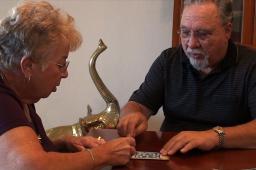
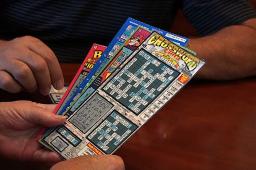
Lucy and Richard Sterba look at Scratchers tickets at their Gold Canyon home. A Cronkite News Service review found that the Sterbas’ ZIP code, 85218, was the hottest spot for lottery players in fiscal 2009. The review suggests that the most frequent Arizona Lottery players are those who are a little older and who have a little more money. (Cronkite News Service Photo by Kristena Hansen)
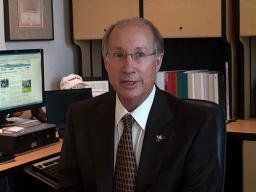
Jeff Hatch-Miller, the Arizona Lottery’s executive director, said that while the lottery’s mission is to appeal to the broadest possible audience older players enjoy buying tickets because they don’t cost much and are a way to socialize. A Cronkite News Service review suggests that the most frequent Arizona Lottery players are those who are a little older and who have a little more money. (Cronkite News Service Photo by Kristena Hansen)
LOTTERY HOTSPOTS
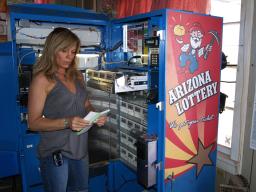
Sheila Larsen, who with her husband, Brad, operates Rosie’s at the Boulder Inn Cafe 35 miles south of Hoover Dam, tends to a lottery ticket machine. Rosie’s was the second-highest-grossing Arizona Lottery retailer in fiscal 2009, topped only by a convenience store in the Arizona Strip community of Littlefield. Operators credit both stores’ proximity to Nevada, which has no lottery. (Cronkite News Service Photo by Ryan Van Velzer)
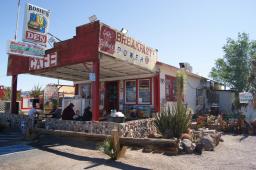
Rosie’s at the Boulder Inn Cafe, 35 miles south of Hoover Dam along U.S. Highway 93, was the second-highest-grossing Arizona Lottery retailer in fiscal 2009, topped only by a convenience store in the Arizona Strip community of Littlefield. Operators credit both stores’ proximity to Nevada, which has no lottery. (Cronkite News Service Photo by Ryan Van Velzer)
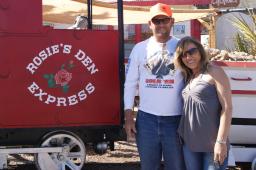
Sheila and Brad Larsen operate Rosie’s at the Boulder Inn Cafe, 35 miles south of Hoover Dam along U.S. Highway 93. Their business was the second-highest-grossing Arizona Lottery retailer in fiscal 2009, topped only by a convenience store in the Arizona Strip community of Littlefield. Operators credit both stores’ proximity to Nevada, which has no lottery. (Cronkite News Service Photo by Ryan Van Velzer)
LAWMAKERS-DISCLOSURE
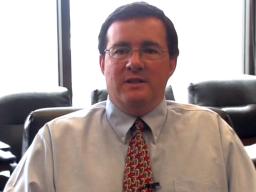
Assistant Secretary of State Jim Drake, shown in an interview, says financial disclosure forms for Arizona lawmakers are intended to point to potential conflicts of interest rather than provide estimates of lawmakers’ worth. Ranges lawmakers use to assign values to their assets haven’t been updated since they were introduced in 1984, and a top value range of “more than $100,000” makes it impossible to estimate the maximum possible value of the holdings of 49 out of 90 lawmakers serving at the start of the 2010 session. Congressional disclosure forms allow for such estimates in nearly all cases because they have more value ranges and a top range of $50 million and up. (Cronkite News Service Photo by Yvonne Gonzalez)
IMMIGRATION-VISAS
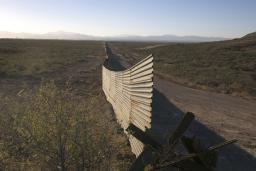
A border wall a few miles from Agua Prieta, Mexico, and Douglas, Ariz., is shown in this 2008 photo. While the term illegal immigrant often evokes images of people eluding authorities at the border, a large share of those in the U.S. illegally arrived with non-immigrant visas and stayed. (Cronkite News Service Photo by Courtney Sargent)